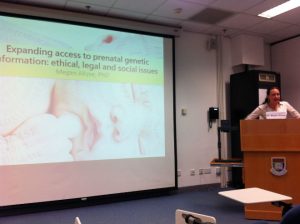Noninvasive prenatal testing (NIPT) using fetal DNA circulating in maternal blood to test for certain trisomies, as well as characteristics such as fetal sex, represents a next generation technology which has been brought to the market by a handful of companies and integrated into clinical care at a rapid pace. The swift global uptake of this entirely commercially developed and largely unregulated technology presents ethical, social and policy challenges. Concerns regarding cultural norms surrounding sex preference, stigma against disabled individuals, and the nature of individual informed consent vs. familial decision-making may become increasingly pressing as NIPT offers the prospect of making fetal information widely available early in pregnancy at a relatively accessible cost and without significant health impact. This talk will discuss the possibilities, limitations and risks of this new diagnostic tool, emerging regulatory and policy responses, and the need for appropriate patient and provider education and dialogue.
Speaker(s):
Dr. Megan Allyse, Law and Biosciences Fellow, Institute for Genome Science and Policy, Duke University, USA
Megan Allyse, Ph.D., received her Ph.D. in Sociology and Social Policy from the University of Nottingham, where she studied ethics and science policy related to oocyte donation in California, the UK, and China. She was a post-doctoral fellow at the Center for Integration of Research on Genetics and Ethics at Stanford University (CIRGE). Dr. Allyse is now a Law and Biosciences Fellow at the Institute for Genome Science and Policy at Duke University. Her research interests include normativity in public and social policy, intercultural ethical comparisons, and public health ethics and policy.
PowerPoint Slides:
Click here



